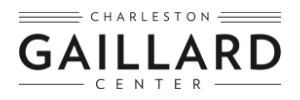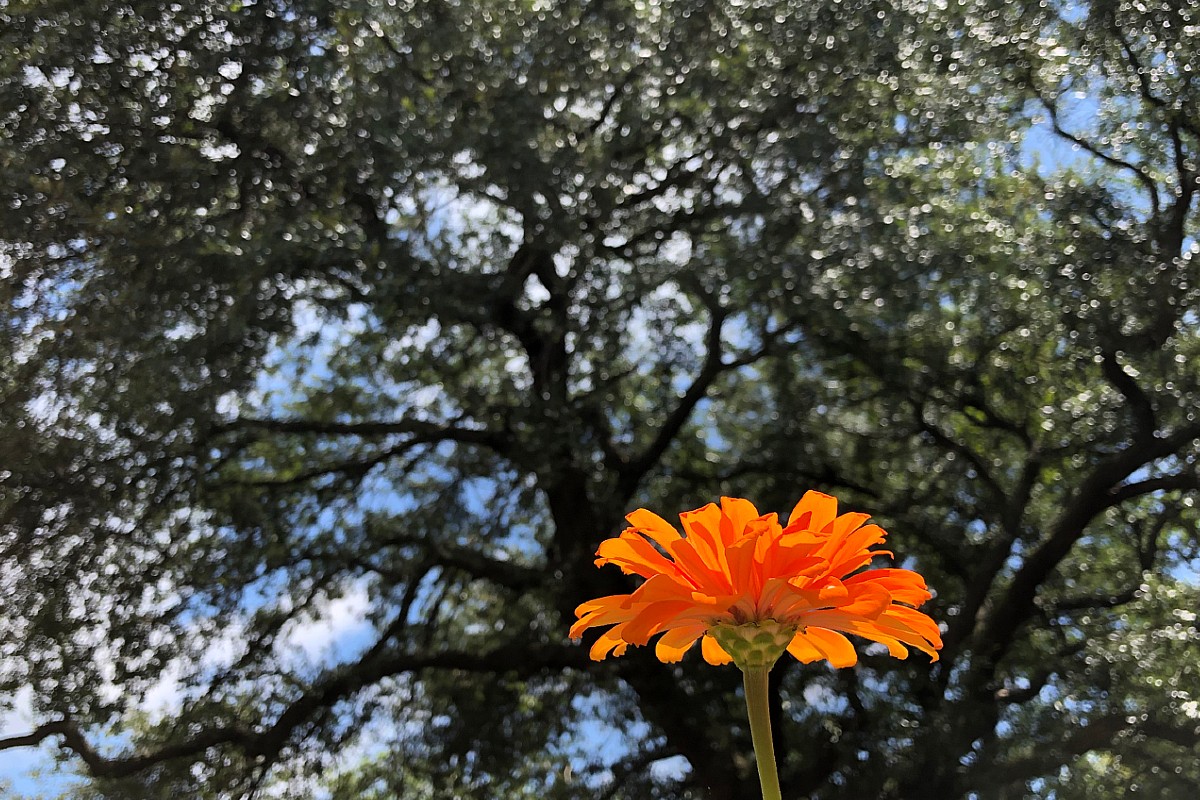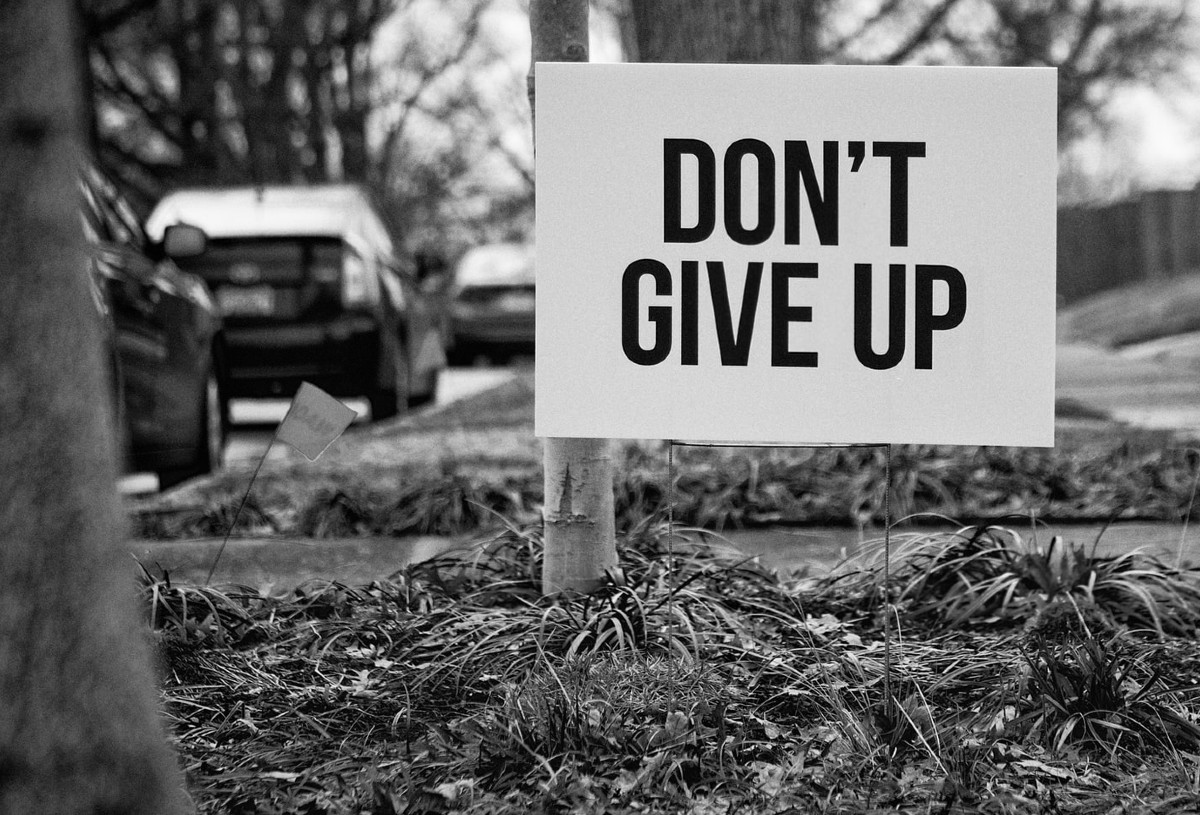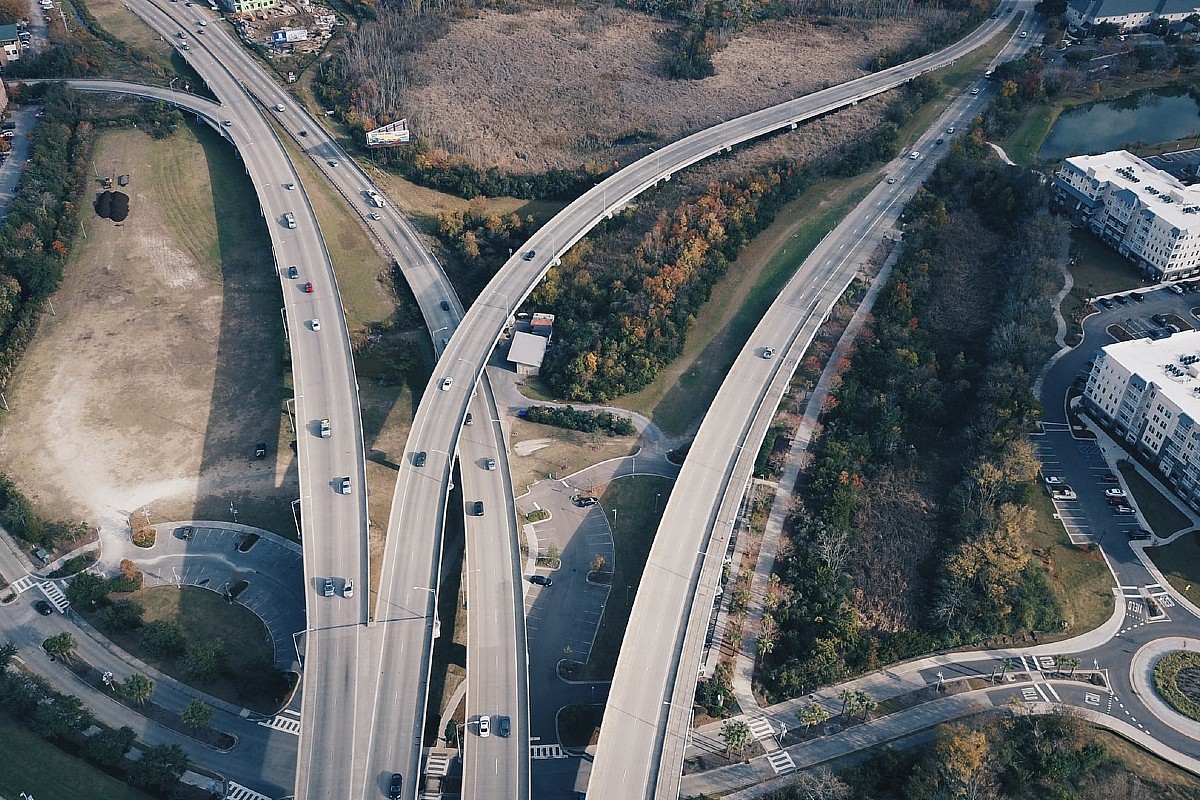Charleston Currents #12.39 | Aug. 17, 2020
ZINNIA ZINGER. This beautiful orange zinnia is a perfect summer example of its species — proud, tall and lifting its petals to the sun. In the background is a majestic live oak. If you’ve got a photo our readers should see, send it along to: editor@charlestoncurrents.com. Photo by Andy Brack.
 TODAY’S FOCUS, Morris: Encountering hope during a pandemic
TODAY’S FOCUS, Morris: Encountering hope during a pandemic
COMMENTARY, Brack: Remembering Floyd Breeland’s life of exemplary service
IN THE SPOTLIGHT: Charleston Gaillard Center
ANOTHER VIEW, West: To be or not be in person in the classroom
NEWS BRIEFS: SCETV is helping gaps in teaching with remote learning
FEEDBACK: Send us your thoughts
MYSTERY PHOTO: Spaghetti roadways
CALENDAR: Music, art, wine on calendar
NEW BOOK: More Charleston firsts
Encountering hope during a pandemic
By Kyra Morris, contributing editor | It is not over. This pandemic is still wreaking havoc with our lives.
- We still need to wear masks when we go into public places.
- We still need to wear masks anywhere when we are going to be closer than 6 feet from another person.
- We still need to wash our hands after doing any activity that has us touching things.
- We still must be careful about any socialization or eating out.
- We still must consider whether an activity will be indoors where ventilation is a key or outdoors where the air is free-flowing
The difficult part of this is that the only certainty is uncertainty. How do we therefore determine what is important?
As we continue our journey of uncertainty, many of us experience “hedonic adaptation.” This is the capacity for human beings to adapt to their new circumstances, for better or for worse. Many studies show that we can quickly adapt to a new baseline — a new normal.
- We expect to see others with masks on in public.
- We give way to others for space either as we pass them on the sidewalk or in the grocery aisle.
- We eat out less and are getting used to planning meals for the home.
It is part of our new life process, our new normal.
Many of us may have experienced profound challenges like loss of loved ones or illness or financial insecurity. Hedonic adaptation is also how people fall in love even when gravely ill or how children in refugee camps still play soccer. Even when things are not good, we are able to adapt and create comfort within our discomfort.
Hedonic adaptation is a process that can bring hope. We can adjust and become comfortable with the new normal. We also can make a choice to take this even further. We can make the choice to recognize those things that make us smile and bring us joy:
- Facetime with loved ones feels so special.
- An encouraging note from a friend warms our heart.
- Sunsets at the end of the street looking onto the harbor burst with color.
- Curling up with a good book (maybe one that is not technical) makes us calm.
- Taking a quiet time guides our soul and calms our spirit
We can make a choice to be aware of what makes us smile.
My 5-year-old granddaughter, Georgie, and I went for a walk recently. She had on her bright yellow mask and I had a colorful one made by a friend. Every person she saw, she commented on something special about them. She had to shout through her mask, yet she did it. “I like your shoes.” “What a pretty shirt.” “Your hair is lovely.” I was delighted and amazed by her. It seemed to come naturally.
I asked her why she spoke to everyone that way, and in her 5-year-old wisdom, she said, “The virus makes people sad. I want to make them happy.”
Professionally, I enjoy what I do. My team and I are reading, studying and reviewing the facts of the economic and financial situation as best we can every day. I have a strong, healthy (something I am grateful for) team – a team that cares about others. When I think of the people who feel like family to me, my client base and my staff come to mind quickly. I am blessed and truly grateful. My work and the people I work for make me smile.
We must be proactive to be grateful. We must make the choice to see, to hear and to share. Have you noticed that even with a mask on, you can tell when someone is smiling? I saw the people smile as Georgie spoke to them. It made me happy. Gratitude, contentment and lasting joy may not come naturally. We can dwell on all the yuck of the new normal, or we can shout through our masks, and find those things that make us smile. That may be what our foundation should be. That may be what is truly important.
My wish for you is to find many things today that make you smile and to recognize what is truly important.
Kyra H. Morris, a Certified Financial Planner, is CEO of Morris Financial Concepts, Inc., in Mount Pleasant. A national leader in the financial planning profession, she has been named several times by leading magazines as one of the country’s top financial planners.
Remembering Floyd Breeland’s life of exemplary service
By Andy Brack, editor and publisher | They called him Big Thunder.
His rich baritone soared when he talked and resonated even more when he sang.
 Former state Rep. Floyd Breeland, who passed away Tuesday at 87, loved public service, first as a teacher, then as a high school administrator and finally in the Statehouse. After representing the Charleston peninsula from 1993 to 2007, he continued to serve by running a College of Charleston program to encourage young Black men to be teachers and role models for kids.
Former state Rep. Floyd Breeland, who passed away Tuesday at 87, loved public service, first as a teacher, then as a high school administrator and finally in the Statehouse. After representing the Charleston peninsula from 1993 to 2007, he continued to serve by running a College of Charleston program to encourage young Black men to be teachers and role models for kids.
“Representative Breeland was a fine man and an exemplary public servant,” recalls House Speaker Jay Lucas, R-Hartsville. “We spent eight years serving in the House together, and I will always remember Floyd for his kind spirit and marvelous singing voice. His album still sits in my collection, and I will cherish it along with my many fond memories of him.”
Many recalled how Breeland’s gentle but solid strength held sway when colleagues needed to be reminded of the right thing to do.
“Floyd Breeland was a quiet leader with a big heart for his fellow South Carolinians, especially the young people,” said former Gov. David Beasley, now head of the World Food Program. “He lived his life in service to them, as an educator and as a state representative.
“When I was working as governor on important education legislation, I knew that any feedback I got from him was honest and represented what he thought was best for the children of our state. Even as we miss him, we should all follow the example he set by being kind and humble every day.”
For years, state Rep. David Mack, D-North Charleston, sat next to Breeland on the floor of the S.C. House. Breeland was a confidant and friend.
“Behind that incredible smile was a giving heart,” Mack said. “He loved people. He blessed so many people as an educator and later as a legislator. We thank God for the time Floyd Breeland got to spend with us. Rest in peace, my brother.”
For Charleston native and Columbia lawyer Edwin Givens, Breeland was like an uncle, a longtime friend of the family.
“I could talk to him about things that sometimes I couldn’t talk to my dad about,” Givens wrote on Facebook. Later he added in an interview, “He was a selfless person — just someone who was always willing to serve. He never sought the limelight. He accomplished so much by not seeing the limelight, but getting the job done.”
Breeland, born and raised near St. George, moved to Charleston after graduating in 1955 from Allen University, where he was a roommate of Daniel Martin Sr., a former S.C. circuit judge and legislator.
Many remember Breeland’s 33 years as a Charleston music teacher and a high school principal. Others recall him in Charleston’s important first production of “Porgy and Bess” in 1970 during South Carolina’s tricentennial celebration.
“He used to tease me about my accent when I would pronounce ‘house,’ former state Rep. Jimmy Bailey of Charleston said. “I would look at him and say, ‘You understand what i am saying, but some of those from the Upstate don’t!’”
Others remembered the respect Breeland had for everyone.
“He worked for his constituents and always put them first,” said state Sen. Paul Campbel, R-Goose Creek. “He was a joy to work with and will be missed in our part of the world.”
Former state Rep. Vida Miller of Pawleys Island remembered Breeland’s smile, compassion and integrity. “In stressful moments on the House floor, he would take to the podium and sing in his wonderful bass voice — always calming and with a standing ovation. He was a gentleman and a true statesman. His earthly presence will be greatly missed, but the angels are rejoicing.”
Charleston Mayor John Tecklenburg said people throughout the city grieved.
“Floyd Breeland was a dedicated public servant, a faithful friend, and a kind and thoughtful neighbor, as Sandy and I had the pleasure of discovering when we lived down the street from Floyd and his remarkable family many years ago in Hampton Terrace. We join the whole Charleston community in mourning his loss, and in celebrating the extraordinary life and legacy he leaves behind.”
Floyd Breeland, 1933-2020. Rest in peace.
Andy Brack is editor and publisher of Charleston Currents. Have a comment? Have a comment? Send to: editor@charlestoncurrents.com.
Charleston Gaillard Center
 Charleston Gaillard Center provides the Lowcountry with a world-class performance hall, elegant venue space and vibrant educational opportunities that inspire dynamic communities throughout the area through the power of the performing arts. The Center’s vision is to enrich the diverse community of Charleston with artistic and cultural experiences that are accessible and unique, and to serve as an educational resource for generations to come.
Charleston Gaillard Center provides the Lowcountry with a world-class performance hall, elegant venue space and vibrant educational opportunities that inspire dynamic communities throughout the area through the power of the performing arts. The Center’s vision is to enrich the diverse community of Charleston with artistic and cultural experiences that are accessible and unique, and to serve as an educational resource for generations to come.
Did you know that the Charleston Gaillard Center is a 501c3 non-profit that works with over 25,000 students each year from the tri-county area? Promoting education is one of the core values of the Charleston Gaillard Center and an integral part of our mission. By broadening the reach of arts-education in the Lowcountry the Gaillard Center encourages learning through the arts and serves as a powerful tool for student achievement and personal development while providing people of all ages with the opportunity to cultivate and grow their talents and appreciation for the arts. To learn more about our education initiative, click here: www.gaillardcenter.org/outreach.
For more information, click the links below:
- Buy tickets and see our great events
- Become a member today
- Plan your event at the Charleston Gaillard Center
- Learn about our education and community programs
- Contact the Gaillard Center.
- To meet all of our underwriters, click here.
To be or not be in person in the classroom
By Gary West, special to Charleston Currents | On July 15, 2020, Gov. Henry McMaster lobbied for opening schools for all of South Carolina’s children – full classrooms, full-time, five days a week – while the pandemic continues to spread faster and farther.
Each school district in South Carolina has been required to submit a reopening plan to the South Carolina Department of Education (SCDE). And all those plans were required to have an option for parents to send their students to school.
Since the governor announced his plan to reopen all South Carolina schools, the following events have taken place:
- The South Carolina branch of the American Academy of Pediatrics (AAP) expressed concerns that its original position on reopening schools was being politicized. The AAP clarification indicates that the safety, health and well-being of students must be primary in reopening schools.
- The White House coronavirus task force listed South Carolina as a COVID-19 “red zone” state.
- As a result of full classrooms, hundreds of students and staff in Georgia’s public schools have contracted COVID-19 (including almost 900 student athletes) and thousands are being quarantined – after just one week in school. All involved schools have shut down or gone to online learning.
- South Carolina’s state epidemiologist has stated the governor has misled the public about her position on reopening segments of the state’s economy and schools.
- SCDE has approved all school district plans for reopening schools.
- The governor has instructed the state Department of Health and Environmental Control to “collect, compile, and disclose information regarding confirmed COVID-19 cases among students and staff in every school district in the state.”
New AAP research states that children’s counts and rates will go higher when the general population counts and rates go higher. The general population can protect children, teens and vulnerable adults only with “physical distancing, wearing cloth face coverings, washing our hands, and avoiding large gatherings” – none of which “red zone” South Carolina requires.
The AAP, the Centers for Disease Control and others have stated that states with positivity rates below 5 percent might consider in-person classes, with all the necessary health and safety measures in place. South Carolina continues to have positivity rates between 15 percent and 20 percent. If the coronavirus is still spreading at those rates, “it is inevitable it will follow students and staff to school” – and then back home – according to the AAP.
International and national research indicates children transmit the virus at the same rates and with the same potency as do adults. South Carolina’s school children can:
- be infected at school by other children and adults,
- infect other children and adults at school, and, importantly,
- take it home with them where vulnerable family members can be infected.
In South Carolina, young adults were not infected by and did not transmit the virus at high rates UNTIL the governor reopened the beaches, bars, lakes, etc. After that, young adults became a major driver of the virus across the state.
The events of the last few weeks and important new research indicate we can expect school-aged children to become another major driver when South Carolina’s public schools reopen in-person while the pandemic remains uncontrolled.
Parents in South Carolina are in a no-win situation. When their kids are sick with COVID-19, those parents must stay home. When other kids are sick with COVID-19 and schools are constantly in quarantine status, those parents also must stay home.
Parents who must stay home may lose their jobs. Those parents may not be able to qualify for unemployment and/or other stimulus benefits. This will be especially true for single parents because, historically, South Carolina has ignored its most economically vulnerable citizens. And isn’t that ironic – because this is all about the economy – isn’t it?
The school district data collected by DHEC will be meaningful ONLY if those data are used to make decisions about NEXT STEPS to protect children and educators, as well as their families and friends. If the school district data will not be used any better than the statewide data are being used, what’s the point?
The governor has set up South Carolina to fail. He still refuses to shut down the anti-maskers for the good of all South Carolinians. Eventually, he will have to shut down the economy again, whether he likes it or not. His demand for in-person instruction will cause teachers and students to miss more school than if reopening was delayed or done entirely online.
Governor, not to decide is to decide. If you don’t decide, the situation will decide for you. You may not like your options – but one of those will get it done; the other will just keep doing it to you – and the rest of us.
Gary W. West of Greenwood, a former chief information officer for the S.C. Department of Education, has worked in K-12 education for more than 50 years. More of his articles are available here.
SCETV is helping gaps in teaching with remote learning
Staff reports | South Carolina Educational Television (SCETV)’s public broadcasting is known for helping young children learn from “Sesame Street” and “Super Why,” but its role shifted to aiding teachers with remote-learning in the early days of the coronavirus in the state.
Now as the new school year approaches, the broadcast network will expand K-12 programming while piloting an initiative that allows teachers to use its existing infrastructure to beam content into a student’s device, such as a tablet issued through a school, without the need for an internet connection.
“I don’t think the public is aware of how much SCETV stepped in early on when we closed down the schools. ETV immediately altered its programming to give students an opportunity to at least watch lessons,” said state Rep. Raye Felder, R-Fort Mill. “As the new school year starts, more and more districts will try to come up with innovative and creative ways to notify parents of all the options that are available and I’m hoping ETV will be one of those … Every household may not have a computer, more households have television.”
SCETV Vice President of Education Stephanie Frazier said the agency has worked over the summer to spread awareness, mostly through schools and teachers. Now it’s working on a pilot program called datacasting (data plus broadcasting). The technology reportedly converts a portion of the existing SCETV broadcasting infrastructure for one-way transmission of data sent directly into a device, which could be a parent’s smartphone or a tablet offered through the school district, according to Frazier. Read the full story in Statehouse Report.
In other recent news:
![]() Masks appear to be working. DHEC released data this week showing that it appears widespread mask use is making a dent in confirmed COVID-19 cases, which dipped below 1,000 reported per day. This means instead of projecting more than 7,400 deaths by Dec. 1, the agency projects 3,671 deaths by Dec. 1. Already, the virus has claimed 2,089 lives as of Thursday.
Masks appear to be working. DHEC released data this week showing that it appears widespread mask use is making a dent in confirmed COVID-19 cases, which dipped below 1,000 reported per day. This means instead of projecting more than 7,400 deaths by Dec. 1, the agency projects 3,671 deaths by Dec. 1. Already, the virus has claimed 2,089 lives as of Thursday.
Democrat flips Trump pick’s S.C. House seat. Democratic candidate Spencer Wetmore is the unofficial winner of Tuesday’s special election (results will be certified Aug. 15, check here) to replace the seat left by former James Island Rep. Peter McCoy, a Republican tapped by the Trump administration as a U.S. Attorney for the District of South Carolina earlier this year. Wetmore, who is Folly Beach city administrator, defeated Republican Josh Stokes and Green Party candidate Eugene Platt for the seat. She will have to defend the newly-won seat again Nov. 3 from Stokes in the general election.
Dominion seeks rate hike. Dominion Energy last week filed with the S.C. Public Service Commission for a 7.75 percent electricity rate increase for retail customers in the state. If approved, the typical customer would pay about $9.68 more per month, said the company, which added that base rates haven’t gone up since 2012.
New commissioners. Veronica Hemmingway, Southern Lowcountry director for grantmaking and community leadership at the Coastal Community Foundation in Charleston, is a newly-appointed commissioner to the Gullah Geechee Cultural Heritage Corridor Commission. Selected by the U.S. National Park Service, she and four others were appointed recently by the U.S. Secretary of Interior. Among those stepping down from the commission after serving since it started in 2006 were Charleston attorney Willie Heyward and Hilton Head Island historian Emory Campbell.
Street closed. South Market Street in Charleston is now closed from 9 a.m. to 5 p.m. daily for pedestrians between Church and State streets. The closure, arranged in partnership with City Market vendors and staff, will facilitate social distancing in the area, according to a press release from the city of Charleston.
Statehouse Report’s Lindsay Street contributed to this section. Have a comment? Send to: editor@charlestoncurrents.com
Got something to say? Let us know by mail or email
We’d love to get your impact in one or more ways:
Send us a letter: We love hearing from readers. Comments are limited to 250 words or less. Please include your name and contact information. Send your letters to: editor@charlestoncurrents.com. | Read our feedback policy.
Tell us what you love about the Lowcountry. Send a short comment – 100 words to 150 words – that describes something you really enjoy about the Lowcountry. It can be big or small. It can be a place, a thing or something you see. It might be the bakery where you get a morning croissant or a business or government entity doing a good job. We’ll highlight your entry in a coming issue of Charleston Currents. We look forward to hearing from you.
Spaghetti roadways
Here’s a combobulation of roadways. Where is it? Know anything else about it? Send your best guess of what it is as well as something about it. Send to editor@charlestoncurrents.com. And don’t forget to include your name and the town in which you live.
Our previous Mystery Photo
Our Aug. 10 photo, “Where’s this fountain?” was a tough photo to identify. It showed a fountain off Ashley Avenue in Allan Park just blocks from Hampton Park in Charleston.
Congratulations to the three readers who identified it correctly: Chris Brooks of Mount Pleasant; George Graf of Palmyra, Va.; and Allan Peel of San Antonio, Texas.
Peel writes: “Allan Park is one of the smallest parks in Charleston. The land on which the park resides was donated to the City of Charleston by Mrs. Amey Allan, the widow of James Allan (the developer of most of the eastern half of nearby Hampton Park Terrace parks) in March 1920. Allan’s original design for the park included lining it with palmetto trees, the state tree of South Carolina, as well as a large fountain surrounded by a flower bed located at the center of the park. Sadly, over the years, the maintenance of the park dwindled and by 1924, the fountain water jets had been broken, and the main basin was filled with soil and converted to a raised flower bed. At some point in the park’s history, the palmetto trees were removed and the park lined with the oak trees that populate the park today.
“Allan Park began being used more frequently in the 1990s. For example, during the annual Spoleto festivals, the Charleston Symphony would erect a large stage and tent and perform a concert for many neighbors who brought picnic blankets to the park. In 2000, the neighborhood encouraged the city leaders to replace the original fountain with a new fountain. The design depicted in the mystery photo was chosen, and consisted of a series of three, plain, cast-concrete bowls with water flowing into the main basin. During the first year after its construction, the City maintained the raised beds surrounding the fountain with colorful flowers, but once again park maintenance lagged in the years which followed, and by 2002 (just 2-years after it was installed), the fountain stopped working and again sat idle, until 2004 when the city repaired it back to working order.
“Today, the space has become a gathering place for neighbors and a centerpiece of the surrounding community. The park is well maintained, however, based on the the chips and peeling paint seen in the mystery photo, it does look like the fountain could use a bit of ‘tender loving care.’”
- Send us a mystery: If you have a photo that you believe will stump readers, send it along (but make sure to tell us what it is because it may stump us too!) Send it along to editor@charlestoncurrents.com.
Music, art, wine on calendar
![]() Lowcountry Listens each Wednesday. Want some local music with real social distancing? Tune in each Wednesday at 6 p.m. to the Gaillard Center’s Lowcountry Listens program for new performances. To watch, go to the venue’s homepage, Facebook page or YouTube channel at 6 p.m. Wednesday. On tap this week on Aug. 19: Chaquis Maliq The EccentroSoul 1 Woman Band. Part three of the series starts soon.
Lowcountry Listens each Wednesday. Want some local music with real social distancing? Tune in each Wednesday at 6 p.m. to the Gaillard Center’s Lowcountry Listens program for new performances. To watch, go to the venue’s homepage, Facebook page or YouTube channel at 6 p.m. Wednesday. On tap this week on Aug. 19: Chaquis Maliq The EccentroSoul 1 Woman Band. Part three of the series starts soon.
Wine Down Wednesday: 5 p.m. to 7 p.m. on Aug. 19. Old Towne Creek County Park will host this event in West Ashley with wine and live music — a perfect pairing to relax at midweek. Food truck fare will be available. Cost: 15. Limited to 150 people. Advanced registration required.
Studio Works at Redux: Through Aug. 28, Redux Contemporary Art Center, Charleston. The center is presenting a solo exhibition featuring the work of North Charleston artist Fletcher Williams III. It features recent works on paper pulled directly from Williams’s studio. Highlights include 50 black-and-white single pickets evocative of featureless portraits, small-scale exploratory studies, and a collection of color-saturated works painted in synthetic and natural greens, lush blues, and bold turmeric tones. More.
Vintage market: Noon to 3 p.m., Sept. 13, via Instagram. Holy City Vintage Market will hold a virtual event to allow shoppers to view hundreds of items for purchase over three hours. How it works: Watch HCVM’s Instagram story as we repost items for sale from 20 local vintage, secondhand, and artisan vendors. Shoppers can DM individual shops to arrange purchase and no-contact shipping, drop-off, or pickup details. More.
“Connections” on display: Through Oct. 24, Redux Contemporary Art Center, Charleston. The exhibition of works by Gret Macintosh features looks at physical connections between places, such as waterways, roads, and bridges that the artist has experienced over the last 15 years of living in the Charleston area. The exhibition is open 11 a.m. to 4 p.m., Mondays and Wednesdays; 11 a.m. to 3 p.m. Fridays; and by appointment. More.
From Etchings to Pastels: Through Nov. 29, Lowcountry Image Gallery, The Charleston Museum. The museum has partnered with the Pastel Society of South Carolina to present new interpretations of etchings stemming from the Charleston Renaissance Movement about 100 years ago. Learn more.
Online offerings:
- Gibbes Museum. You can enjoy lots of local art offerings through the website and social media accounts of the Gibbes Museum. At 10 a.m. on weekdays, the museum posts virtual readings and workshops on Facebook. Find more online.
- Avian Conservation Center. Access videos and live streaming presentations online to learn about what’s going on at the Center for Birds of Prey.
- Around the world. You can visit 500 museums across the world online through this Google amalgamation of sites.
If you have any online events, drop us a line (editor@charlestoncurrents.com) and make sure to put “Online event” in the subject line. Similarly, if you’ve got cool ideas for stuff to do while in isolation at home, send them our way.
NEW BOOK: 350 FACTS ABOUT CHARLESTON
More Charleston firsts
Here are three more factual snippets from the new book, 350 Facts About Charleston:
 Nation’s first historic zoning district
Nation’s first historic zoning district
Ever wonder why so much of old downtown Charleston is preserved? It’s because the Charleston City Council established the nation’s first historic zoning district on Oct. 13, 1931, when it created the “Old and Historic District” as well as a Board of Architectural Review, which continues to serve as an authority on new projects in an effort to preserve and protect historic neighborhoods. “Today, there are more than 2,000 restored old buildings, many having tiered porches called piazzas lining narrow brick alleys, cobblestone streets and walled courtyard gardens. These architectural treasures dating from the 1600s to the Civil War have been preserved and restored under the leadership of the Preservation Society of Charleston,” according to a 1989 story in The Los Angeles Times.
First paid woman artist in America
Henrietta de Beaulieu Dering Johnston (ca. 1674-1729) was the first professional woman artist in America. Born into a Huguenot family that moved to London in 1687, it is unknown how she learned to paint portraits, although they are in the style of a popular English artist of the time. She and her second husband, the Rev. Gideon Johnston, moved to Charleston in 1708 after he was appointed bishop’s commissary in South Carolina by the Bishop of London. Compared to earlier works, her portraits in America “are lighter, simpler, and smaller, indicative of the preciousness of her materials, all of which had to be imported. … Each sitter’s posture is erect, with the head turned slightly toward the viewer. Typically, large oval eyes dominate the subject’s face.” About 40 portraits remain. The Gibbes Museum in Charleston has 10, the largest collection of her work.
Oldest public gardens — and first Charleston tourist destination
Magnolia Plantation, founded by the Drayton family in the 1670s, is the oldest plantation on the Ashley River. It also “has earned the distinction as the oldest public garden in the United States,” according to Explore Charleston. “The Rev. John Grimké Drayton expanded the gardens in the 1840s, opening them three decades later to steamboat passengers. As a result, Magnolia also enjoys being Charleston’s first tourist destination.” In 2019, the attraction hosted “Lights of Magnolia,” a Chinese lantern festival illuminating the gardens for the first time in its history.
350 Facts About Charleston, a new book of historical facts commemorating the 350th anniversary of the city of Charleston, will be available in print in mid-September. Published by the staff of sister publication, Charleston City Paper, you can pre-order a copy today.
As more people stay home to deal with the coronavirus crisis, people are looking for things to do. You can find some fun things to do online in our calendar section below, but let us also encourage you to FORWARD your issue of Charleston Currents to your friends and encourage them to subscribe. It’s got a great price, as you know: Free! We hope they’ll enjoy our coverage.
- DONATE. Now also would be a great time to contribute as we deal with the crisis. In advance, thank you.
OUR UNDERWRITERS
Charleston Currents is an underwriter-supported weekly online journal of good news about the Charleston area and Lowcountry of South Carolina.
- Meet our underwriters
- To learn more about how your organization or business can benefit, click here to contact us. Or give us a holler on the phone at: 843.670.3996.
OUR TEAM
Charleston Currents offers insightful community comment and good news on events each week. It cuts through the information clutter to offer the best of what’s happening locally.
- Mailing address: 1316 Rutledge Avenue | Charleston, SC 29403
- Phone: 843.670.3996
Charleston Currents is provided to you weekly by:
- Editor and publisher: Andy Brack, 843.670.3996
- Contributing editor, common good, Fred Palm
- Contributing editor, money: Kyra Morris
- Contributing editor, Palmetto Poem: Marjory Wentworth
- Contributing editor, real estate: Digit Matheny
- Contributing photographer: Rob Byko
- Charleston Currents also uses content from the outstanding staff at the Charleston City Paper, a sister publication.
SUBSCRIBE FOR FREE
Subscriptions to Charleston Currents are free.
- Click here to subscribe.
- Unsubscribe. We don’t want to lose you as a reader of Charleston Currents, but if you must unsubscribe, you will have to do it through the email edition you receive. Just go to the bottom of any of your weekly newsletters and click the “unsubscribe” function. If that doesn’t work, please send us an email with the word “unsubscribe” in the subject line.
- © 2008-2020, City Paper Publishing, LLC. All rights reserved. Charleston Currents is published every Monday by City Paper Publishing LLC, 1316 Rutledge Ave., Charleston, SC 29403.











 We Can Do Better, South Carolina!
We Can Do Better, South Carolina!
























